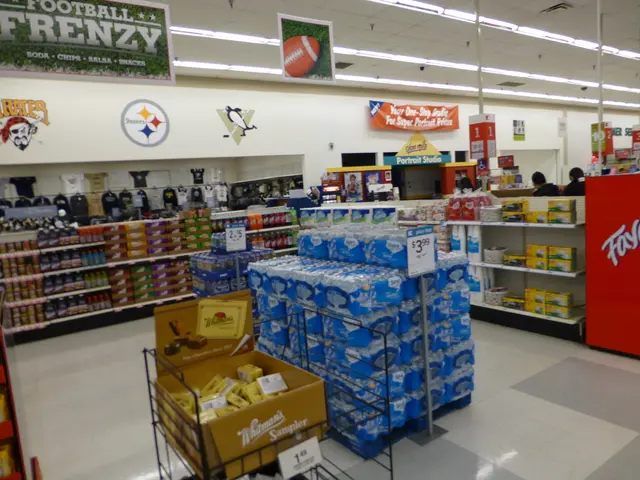Shopping at Select Grocery Stores to Evade Tariff-Related Price Hikes
Surviving the Tariff Nightmare: Your Grocery Shopping Guide
These days, the word "tariff" seems to lurk around every corner, sparking anxiety in most households. With predicted price increases and shortages looming, your family budget could take a significant hit – a study predicts an average of $3,800 per household this year alone.
If you're keen on dodging tariff surcharges, especially when it comes to groceries, buckle up. It's going to be a tough ride. Approximately 15% of our food supply is imported, but that figure doesn't account for domestically-sourced food using imported ingredients. And some staples, like coffee or bananas, are nearly entirely imported. But if you're determined to steer clear of tariffs on your grocery bills, better luck to ya.
Albertsons: The Savior We Never Asked For
Amidst all the gloom, there's a speck of sunshine: Grocer magnate Albertsons declared in the dead of March that they wouldn't bend over backwards for automatic price increases triggered by tariffs. This policy seems designed to keep prices at their current levels, though Albertsons did clarify that it would evaluate potential price increases on a case-by-case basis. Suppliers would need to apply for a price hike, and Albertsons would decide whether to grant the request.
Albertsons already sources around 90% of its products domestically, though this doesn't necessarily mean that imported ingredients or other components aren't part of those domestic products. Nevertheless, Albertsons' stance could have a tangible impact on prices. And let's not forget, Albertsons is a behemoth: They own more than 20 supermarket chains, including Safeway, Acme, Carrs, and Balducci's Food Lovers Market – spread across over 2,200 stores nationwide. You can check out their full list of chains here to see if you're within striking distance.
Other Strategies: If You're Not Near an Albertsons
If you're not within shouting distance of an Albertsons store, your choices are slim.
- Shop Local: Opting for farmer's markets and direct sources will likely keep tariff-induced price hikes at bay. However, farmer's markets tend to be slightly more expensive than grocery stores, so you might not save much by going this route.
- Selective Shopping: Keep an eye on the import status of your grocery purchases. While you might struggle to find domestic coffee at your local store, there are plenty of items that aren't imported and should dodge tariff-induced price hikes. This could be time-consuming, and since products made domestically can still suffer from tariffs if they incorporate imported ingredients or packaging, there's no guarantee you'll evade higher prices by looking for a "made in the USA" label.
It's going to be tough to avoid tariff-induced price hikes unless you live near an Albertsons grocery store, at least for the time being. Until more grocery chains follow in their footsteps, or Albertsons caves under pressure from their suppliers, Albertsons remains your best bet for wiggling out of tariff increases.
On the other hand, Walmart, while not explicitly stating a no-price-increase policy due to tariffs, seems committed to keeping prices low even if it means squeezing their operating margins. While Walmart isn't clear about its opposition to tariff-related price increases in the same way Albertsons is, its focus on capturing customers and maintaining loyalty suggests an attempt to keep prices stable in the face of tariffs – but without a formalized policy.
Other grocery chains have not been specifically mentioned in the search results as announcing similar official tariff-related price increase avoidance policies. Good luck out there, fellow consumers – we're all in this together.
- The looming tariff nightmares on grocery items could cost an average of $3,800 per household this year.
- The grocery industry is particularly affected by tariffs, as approximately 15% of our food supply is imported.
- Warnings and finance experts suggest finding ways to avoid tariff surcharges, especially on groceries, as they could significantly impact household budgets.
- Amidst these challenges, grocer magnate Albertsons demonstrated a promising stance, vowing not to accommodate automatic price increases triggered by tariffs.
- Other strategies to dodge tariff-induced price hikes include shopping local, opting for farmer's markets, and practicing selective shopping for domestically-made items without imported ingredients or packaging.
- For those not within reach of an Albertsons store, their best bet is to stick with top-tier competitors like Walmart, which, although not explicitly stated, seems committed to maintaining low prices amid tariff struggles.








